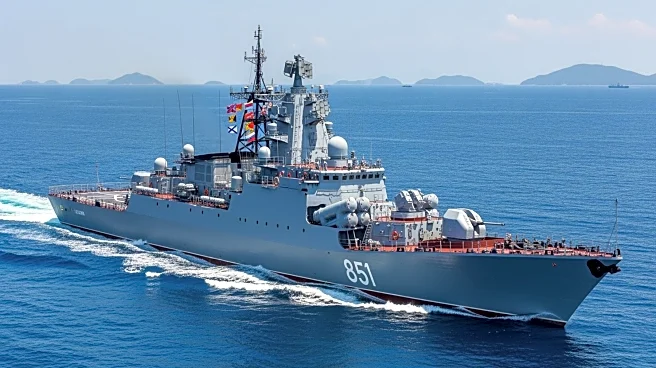What's Happening?
A Russian naval flotilla has arrived in the South China Sea, a region marked by overlapping territorial claims involving several countries, including China. The deployment includes the frigate Marshal
Shaposhnikov, the corvette Gremyashchy, and the large sea tanker Boris Butoma, which docked at the port of Da Nang in Vietnam for a friendly visit. This move comes as Russia maintains a military presence in the Pacific despite its ongoing conflict in Ukraine. The Russian Embassy in Vietnam stated that the visit would include meetings between Russian and Vietnamese naval representatives and tours of local landmarks by Russian sailors. The deployment is part of a broader Asia-Pacific mission that began in early October, with the Russian naval task group departing from Vladivostok and monitored by Japanese forces during its journey.
Why It's Important?
The presence of the Russian navy in the South China Sea highlights Moscow's strategic alignment with China amid territorial disputes involving the Philippines, a U.S. ally. This deployment underscores Russia's intent to bolster diplomatic ties in Southeast Asia, a region where it is perceived positively compared to Western nations. The move also reflects Russia's efforts to maintain influence in the Asia-Pacific region despite facing Western sanctions due to its actions in Ukraine. The visit to Vietnam, a country historically reliant on Russian military equipment, comes as Hanoi strengthens its security ties with both the U.S. and China, indicating a complex geopolitical landscape.
What's Next?
The Russian naval task group's continued presence in Southeast Asia is likely to enhance Russia's diplomatic efforts in the region, potentially strengthening ties with local countries. This comes at a time when Russia faces international isolation due to its war in Ukraine. The deployment may also influence regional dynamics, as countries navigate their relationships with major powers like the U.S., China, and Russia. Future interactions between Russian and Vietnamese officials could lead to increased cooperation in maritime infrastructure and shipbuilding, as discussed during recent meetings between Russian and Vietnamese leaders.
Beyond the Headlines
Russia's deployment in the South China Sea may have deeper implications for regional security and diplomatic relations. The move could be seen as a strategic counterbalance to U.S. influence in the region, particularly in light of ongoing territorial disputes involving China. Additionally, Russia's benign image in Southeast Asia, as noted by experts, may facilitate its diplomatic offensives, allowing it to expand its influence without being perceived as a threat. This could lead to long-term shifts in regional alliances and economic partnerships.










